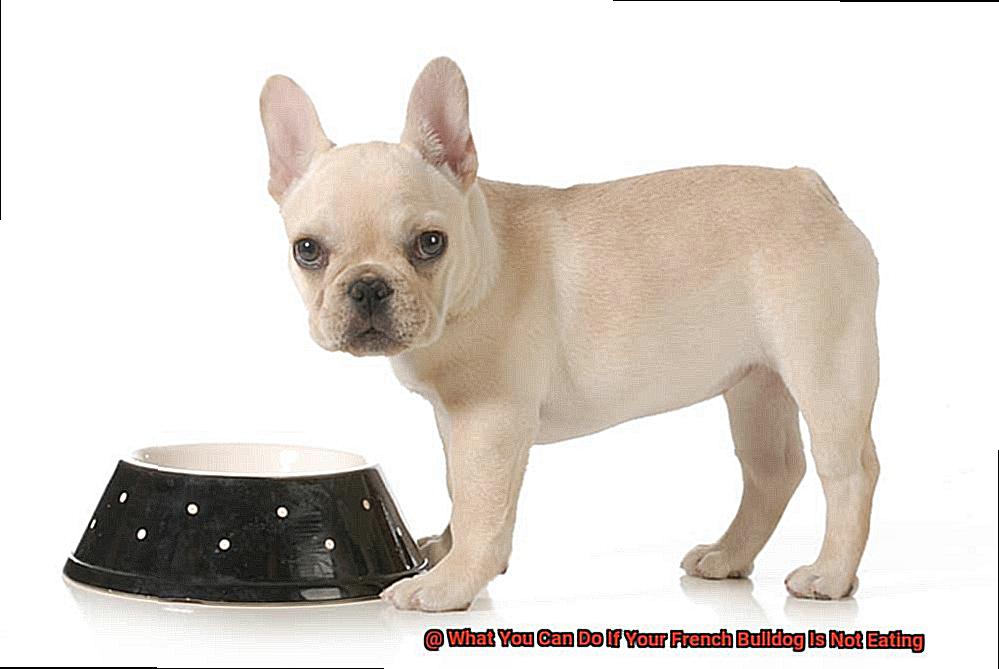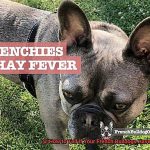What You Can Do If Your French Bulldog Is Not Eating?
You understand that your furry friend can be quite particular about their food choices.
But what if they stop eating altogether? This can be alarming, particularly because Frenchies are prone to health issues like digestive problems and obesity.
However, there’s no need to worry as there are steps you can take to help your pet regain their appetite and get back on track. One possible reason for a lack of appetite in French Bulldogs is dental problems.
Just like humans, dogs can experience discomfort or pain when eating if their teeth are infected or damaged. Another factor could be anxiety or stress, which may arise due to changes in the environment or routine, such as moving to a new house or the absence of their favorite human.
This can result in a loss of appetite or even depression. In this blog post, we’ll discuss various ways to help your Frenchie restore their normal eating habits.
I’ll explore tips for improving dental health, creating a stress-free environment, and even trying out new foods that might entice their taste buds. We understand the love and companionship that French Bulldogs bring into our lives; thus, it’s crucial to address any issues that prevent them from enjoying their meals fully.
So, let’s dive in.
Reasons Why Your French Bulldog Might Be Avoiding Food
Contents
- 1 Reasons Why Your French Bulldog Might Be Avoiding Food
- 2 Observing Your Dog’s Behavior for Other Symptoms
- 3 Changing Their Diet
- 4 Offering Small and Frequent Meals Throughout the Day
- 5 Making Sure the Food is Fresh and at Room Temperature
- 6 Taking Your French Bulldog to the Vet for a Checkup
- 7 Conclusion
There are several reasons why your French Bulldog might be avoiding food, and understanding them is crucial in finding an appropriate solution. One possible reason for this behavior is dental issues.
Due to their short snouts, French Bulldogs can find it challenging to chew their food properly, leading to dental problems such as gum disease, tooth decay, or broken teeth. Just imagine trying to eat with a toothache – it’s no fun.
If you suspect dental issues, take your Frenchie to the vet for a dental checkup and treatment. Another possible reason for avoiding food is stress or anxiety.
Just like humans, dogs can also experience stress and anxiety, leading to a loss of appetite. Major changes in their routine or environment could trigger stress or anxiety, such as moving homes.
Your Frenchie needs a cozy and stable environment to thrive, so reduce any potential stressors if possible. Illness or health issues could also be the culprit.
If your French Bulldog shows symptoms such as vomiting, diarrhea, lethargy, or weight loss, take them to the vet immediately. These symptoms could indicate an underlying medical condition that requires prompt medical attention.
Lastly, boredom with their diet could cause your Frenchie to avoid eating. Imagine eating the same thing every day – it would get dull after a while.
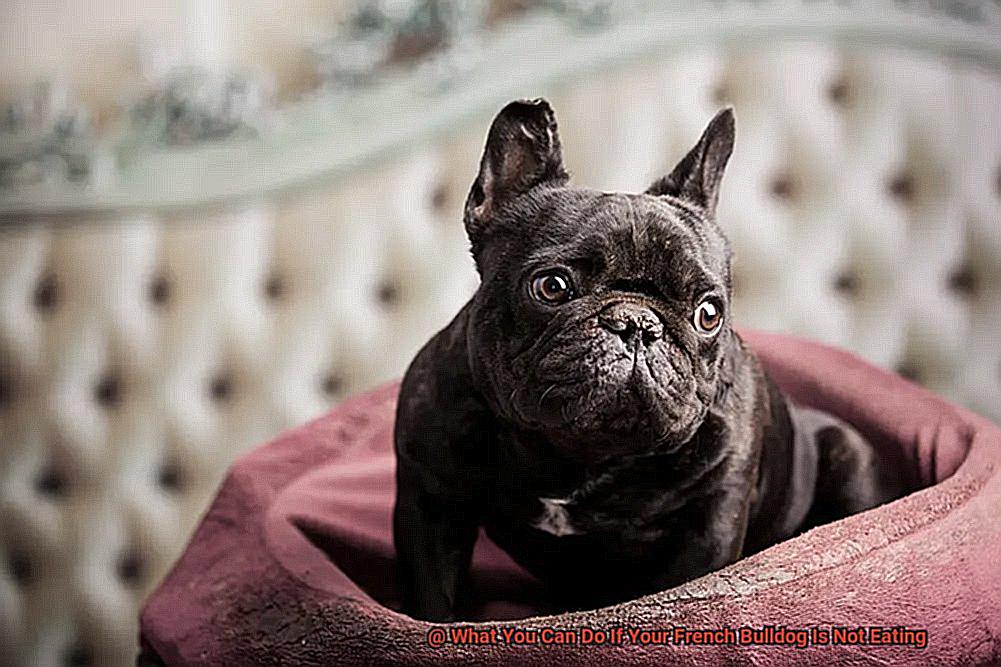
Introduce new foods gradually, but ensure they are suitable for your French Bulldog’s dietary needs. In conclusion, there are several reasons why your French Bulldog might be avoiding food.
Observing Your Dog’s Behavior for Other Symptoms
There are several reasons why your pet may be skipping meals, and one of the best ways to determine the cause is by observing their behavior for other symptoms. When your French Bulldog isn’t eating, pay close attention to any changes in their behavior.
Are they sleeping more than usual? Do they seem to lack their usual energy and playfulness?
These could be signs of lethargy, which may indicate underlying health issues such as anemia or fever. If you notice these symptoms, it’s crucial to take your furry friend to the vet immediately.
Other symptoms to look out for include vomiting, diarrhea, and changes in urination patterns. If your French Bulldog is experiencing any of these symptoms alongside not eating, it could be an indication of gastrointestinal issues or infections.
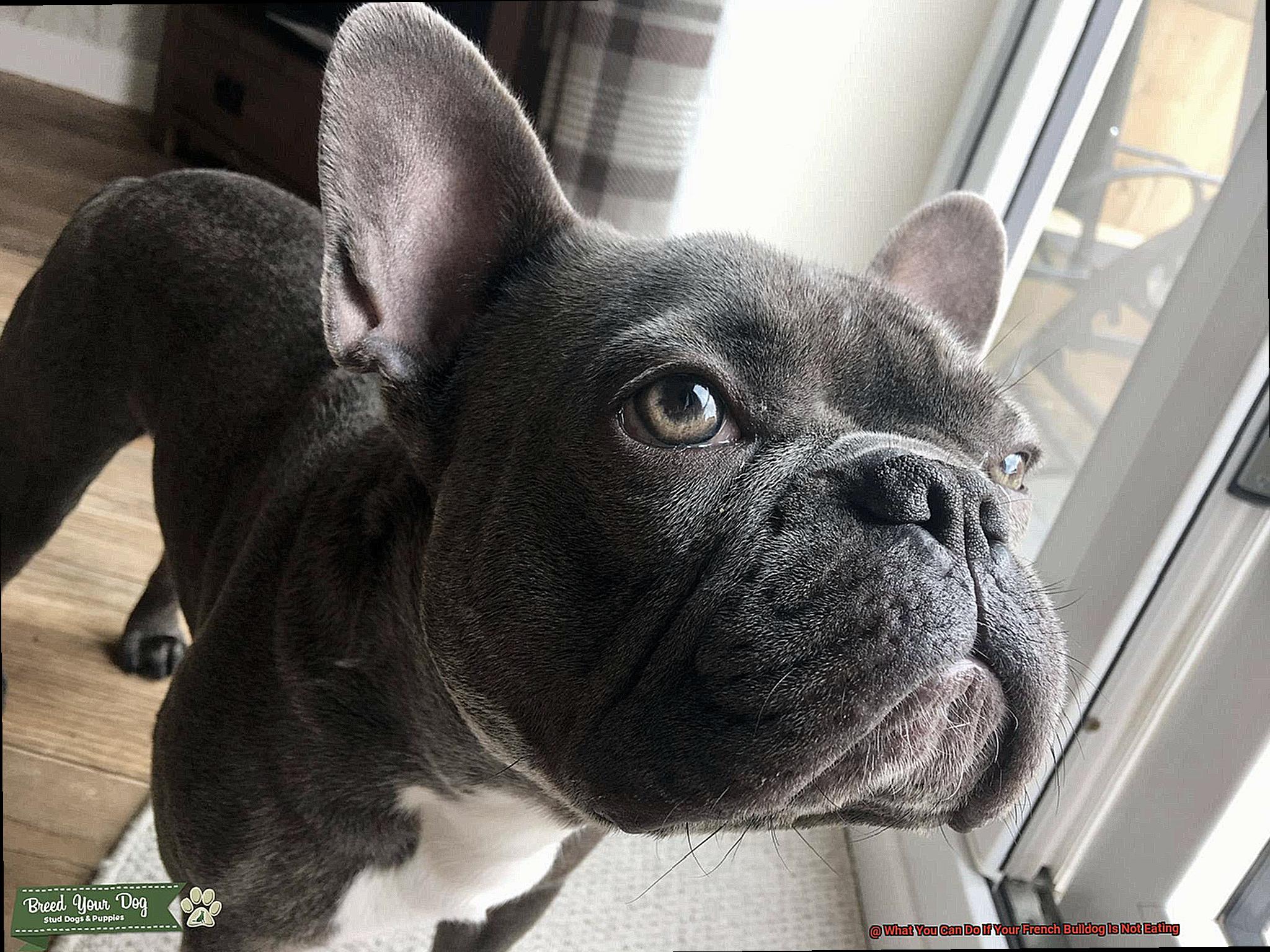
Changes in urination patterns could point towards bladder infections or kidney problems. Besides health issues, stress and anxiety can also lead to a loss of appetite in French Bulldogs.
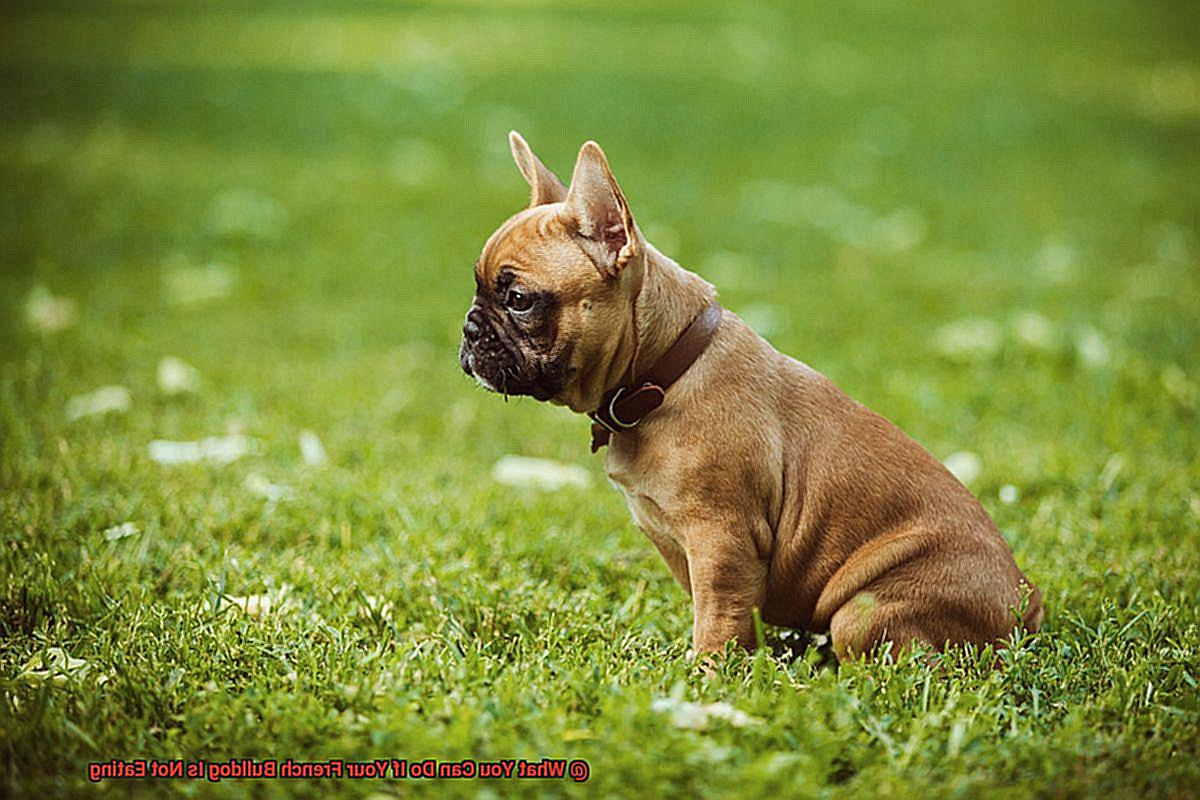
If you suspect that this might be the case, take time to identify the cause of their stress and address it appropriately. For example, if you’ve recently moved to a new home, creating a comfortable and familiar environment for your pet can help ease their anxiety.
Additionally, using calming aids like pheromone sprays or supplements can also prove helpful. In conclusion, observing your French Bulldog’s behavior for other symptoms is critical when they’re not eating.
Changing Their Diet
Changing their diet might just be the solution you need.
However, it’s important to make this change gradually and with the help of a veterinarian to avoid any health issues. Introducing new flavors and ingredients can be a great way to liven up your pup’s mealtime routine.
To do this, start by mixing a small amount of the new food with their current food and gradually increasing the proportion of the new food over time.
Just like adding a little spice to your favorite dish, this slow introduction will allow your furry friend to adjust to the new taste and texture without causing any upset stomachs.
Another option is to try different types of food, such as wet or dry food, or even homemade meals. Every pup has their own unique palate, so experimenting with different options can help you find what works best for them.
You never know, they might have a secret love for salmon that you never knew about. If your French Bulldog is sick, switching to a special diet recommended by your veterinarian may be necessary.
This could include prescription dog food or specific ingredients that will help address any underlying health issues. Your vet will be able to guide you in making these changes safely.
Creating a positive feeding environment is also important for mealtime success. Feeding your pup at regular times in a quiet and calm area without any distractions can make mealtime less stressful and more enjoyable for your furry friend.
It’s also best to avoid giving them treats or table scraps as this can decrease their interest in their regular meals. In conclusion, changing your French Bulldog’s diet can be a helpful solution if they’re not eating, but it’s crucial to do it gradually and with the guidance of a veterinarian.
Remember to create a positive feeding environment, experiment with different options until you find what works best for your furry friend, and always prioritize their health and well-being.
Offering Small and Frequent Meals Throughout the Day
A simple solution is to offer small and frequent meals throughout the day.
Think of it like snacking throughout the day to keep your energy levels up.
This method helps to stimulate your dog’s appetite and prevent them from feeling overwhelmed by a large amount of food all at once. It’s like having little appetizers before the main course – it gets you excited for the meal ahead.
To keep your French Bulldog healthy, it’s important to choose high-quality dog food that is specifically formulated for their breed. You want to make sure your pup is getting all the necessary nutrients they need to stay healthy.
And just like how you might add some seasoning or toppings to your favorite dish, you can add some fresh, cooked meat or vegetables to their meals to make it more appealing. But be careful not to overfeed your furry friend.
Too much food can lead to obesity and health problems. That’s why it’s crucial to monitor their weight and consult with a veterinarian to determine the appropriate amount of food they need and how often they should be fed throughout the day.
And let’s not forget about hydration. Just like how you need water to keep yourself hydrated and feeling good, your French Bulldog needs access to plenty of clean water as well.
Dehydration can cause a loss of appetite, so it’s important to keep your furry friend hydrated at all times.
Making Sure the Food is Fresh and at Room Temperature
It can be frustrating when your pup turns their nose up at their food.
One possible reason for this could be that the food is not fresh or at the right temperature. Fear not, dear reader.
In this post, we’ll share some tips on how to ensure that your French Bulldog’s food is fresh and at room temperature, so they can enjoy their meals to the fullest. Let’s start with canned or wet food.
- Before serving it to your French Bulldog, make sure to check the expiration date. Eating expired food can cause an upset stomach, which can lead to a lack of appetite.
- Also, store the food in a cool and dry place away from direct sunlight to preserve its freshness. This will help keep your pup’s tummy happy and encourage them to eat.
- If your French Bulldog is on a dry kibble diet, storing it in an airtight container is essential. Moisture can cause kibble to go stale, which can make it less appealing to your pup.
- So, keeping it in an airtight container will prevent moisture from getting in and preserve its crunchiness. Additionally, check the manufacturing date on the bag of kibble. If it’s been sitting on the shelf for too long, it may have lost some of its nutritional value.
- Temperature is another crucial factor when it comes to feeding your French Bulldog. They prefer their food to be at room temperature, so avoid serving them cold food straight from the fridge. On the other hand, hot food may be too hot for them to eat right away.
- To avoid this issue, simply let the food cool down to room temperature before serving it. This will increase the chances of your pup enjoying their meal.
By checking expiration dates, storing the food correctly, and serving it at an appropriate temperature, you can make sure that your furry friend enjoys their meals regularly.
Taking Your French Bulldog to the Vet for a Checkup
One of the best ways to ensure your pup’s well-being is by taking them to the vet regularly for checkups.
These visits help identify potential health issues and prevent them from worsening. During a checkup, your veterinarian will perform a thorough examination of your French Bulldog’s overall health.
They’ll check your pup’s weight, temperature, heart rate, and blood pressure. If needed, they’ll also run diagnostic tests, such as blood work, urinalysis, and x-rays.
By doing so, they can catch any potential health issues early on before they become more serious. One essential sign to look out for is a loss of appetite.
If your French Bulldog suddenly stops eating, it could be an indicator of an underlying health problem. In this case, it’s vital to take them to the vet immediately for diagnosis and treatment.
Working closely with your vet and monitoring your dog’s eating habits at home can help you ensure they stay healthy and well-nourished. If your French Bulldog is diagnosed with an underlying health issue that causes them to lose their appetite, the vet will provide a tailored treatment plan.
This may include medication or dietary changes that can help your pup regain their appetite and improve their overall health. Besides regular checkups with a vet, keeping an eye on your French Bulldog’s eating habits at home is crucial.
If you notice any changes in their feeding routine or other signs of illness like vomiting or lethargy, it’s essential to take them to the vet as soon as possible. In conclusion, prioritizing regular checkups with a veterinarian is crucial for maintaining your French Bulldog’s overall health and well-being.
These visits help detect potential issues early on before they become more severe.
Also Read: What to Do If Your French Bulldog Is Not Drinking?
Conclusion
In conclusion, keeping a close eye on your French Bulldog’s eating habits is crucial for their overall health and well-being.
A loss of appetite can be concerning, but there are several steps you can take to help them regain their appetite and get back on track. If your furry friend is experiencing stress or anxiety, it’s essential to create a calm and peaceful environment for them.
Additionally, addressing any dental issues they may have, such as gum disease or broken teeth, can alleviate discomfort and pain when eating. Gradually changing their diet with the guidance of a veterinarian and offering small, frequent meals throughout the day can also help stimulate their appetite.
Make sure that their food is fresh and at room temperature to entice them to eat. Regular checkups with a vet are essential to ensure that any underlying health issues are addressed promptly.
In summary, taking these steps will help ensure that your French Bulldog stays healthy and well-nourished.
